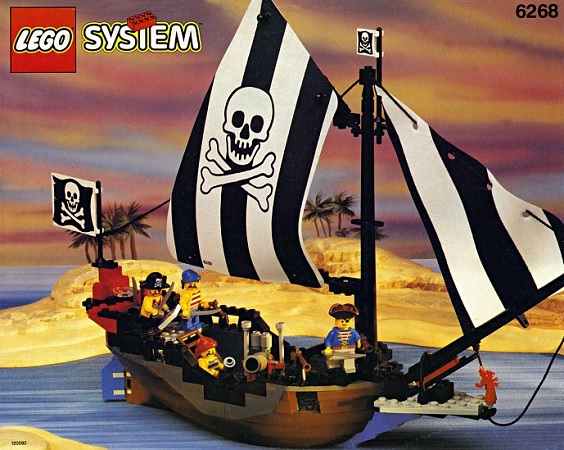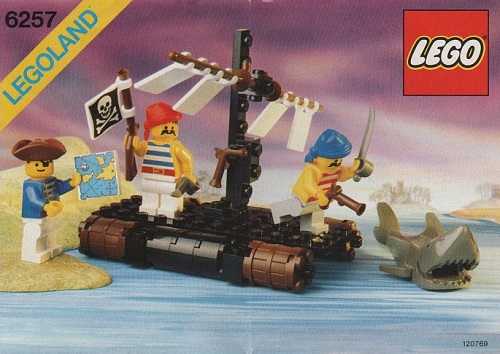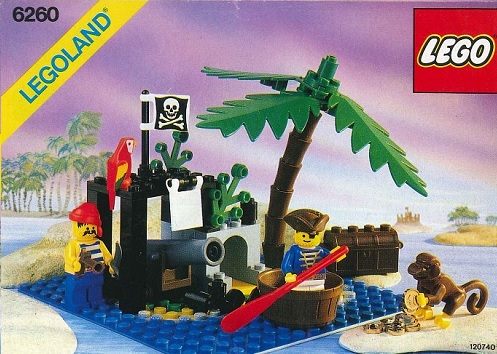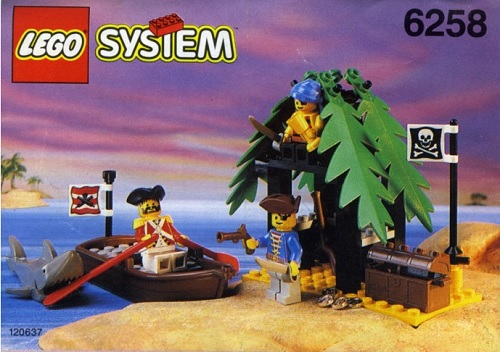
Over the last two years much of my entertainment has been focused on pirates. By pirates, I of course mean the famous fictionalised swashbuckling version of them and not the horrible reality of piracy. I re-watched the Pirates of the Caribbean films through twice, I bought a number of books including On Stranger Tides by Tim Powers; which the fourth film is based on. As well as this I picked up Pirate Latitudes by Michael Crichton and Treasure Island by Robert Louis Stevenson. I also read Robinson Crusoe for the first time — which arguably popularised adventure stories set in the Caribbean much as Treasure Island did for the golden age of piracy specifically, one hundred and fifty years later. In addition to all this I read a history of the Caribbean, the life of Sir Francis Drake and a number of related works. Even video games weren’t excluded as I had a lot of fun playing through the remake of Sid Meier’s Pirates! last year too. I can’t recall what exactly started this but it preoccupied my increasingly scarce free time for a goodly portion of the last two years and has also bled into seeking out swashbucklers in general.
What makes this the more interesting is the film series is more one I’ve wanted to like than one I’ve genuinely loved. And while I’ve come to appreciate these films a lot more (especially with all the dreck that dominates the cinemas today), I still have some significant criticisms of them. Nonetheless, they are starting to be seen more and more as modern classics and I don’t think this in unreasonable. As the first is now twenty years old this year, it is a good time to look at the series as a whole.
It might be best to start (oddly enough), with Lego and I freely admit this is self-indulgent. When I was young, I loved the Lego Pirates series. I didn’t have a lot of these but I acquired all I could and I remember being envious of my cousins who owned the ‘Dark Shark’, a large pirate ship that I always wanted to play with when I visited. I ended up getting a smaller ship set later but I always wanted that one. I always made my pirates win against the opposing Imperial Soldiers which I used to call “Governors” and were funnily enough also sometimes officially identified this way too. Wikipedia has a surprisingly detailed page on the series and I was even able to find images of the sets I owned — though the ones below are not all of them.
So I loved the fictionalised version of the golden age of piracy before I ever read any of the fiction or really understood what it was I liked. This continued up to when I first read books like Treasure Island and the various cartoons and video games that were inspired by it. So when Pirates of the Caribbean: The Curse of the Black Pearl released in 2003, I was very excited to see it.
I remember thinking it was alright. That’s all really. I know I enjoyed it but not quite as much as I expected to. I sometimes wonder if my heightened hopes made me look too critically at it and not enjoy it for what it was. This was after all a film based on a Disneyland ride. I didn’t know that at the time nor did I experience the original ride for the first time until later but it does make me wonder if my expectations were too high. There was more to my expectations than a fun swashbuckler set in the Caribbean though. It was also a Jerry Bruckheimer produced film. Top Gun, Crimson Tide, The Rock, Con Air and Gone in Sixty Seconds were all films I loved as a teenager and young adult; and he was behind all of these and more. Sure there were some pretty ordinary ones but generally I thought nothing he produced could be terrible.
So I didn’t initially think the series was as great as I do now. I saw the immediate sequels and thought the second was good but the third was mostly boring and none of the films did very well with critics. I then forgot about the series and when the fourth was released, I think I saw it on an airplane. I remember enjoying On Stranger Tides and I have on subsequent viewings but it didn’t change my opinion of the previous films. I saw the fifth and what as of writing is still the final film released in the series in 2017. I thought it was good but I had actually forgotten the events of The World’s End which played a significant part in the plot.
Taking all the films into account and thinking about it; the problem all of them have in common is they are overly long. The third film is by far the worst in this regard but I believe all five overstay their welcome. The sweet spot for runtime in almost any action adventure film is around ninety minutes excluding the credits. If you consider most of the best regarded films, this is certainly true. A good example here is The Princess Bride which is around this length and still has some slow parts. The 1993 adaptation of The Three Musketeers which is a personal favourite, also clocks in around this time. All five Pirates films exceed two hours in length and all could easily have been reduced in editing without spoiling a thing.
The first film opens perfectly and I would not change a thing from the time it begins until after the attack on Port Royal. The prologue through the first act set up the major characters and the drama to follow almost flawlessly. The attack also occurs almost exactly at the thirty minute mark which leaves a solid hour to finish the film. Yet it is over an hour and forty minutes until the credits roll. There is a lot of good action and entertainment along the way but also plenty that is unnecessary. The later films have the same problem including the relatively short fifth film (which still exceeds two hours in length). I’m in no way suggesting that films in this genre can’t be longer but they are usually better with brevity and it is certainly true of the Pirates series. I won’t get into where cuts could be made but that I can easily think of entire sequences that are unnecessary suggests it wouldn’t have been too hard to trim them to around 90 minutes.
Outside of this, I don’t have any major complaints about the films because most of the areas I disliked could be fixed by simply trimming the fat off the runtime. That said, I am a little put off a bit by the grotesqueness of certain characters. Particularly the way Davy Jones and his crew look and so too with Salazar in the fifth film and Calypso who features prominently in the second and third films. I didn’t realise at the time that this weirdness with things like voodoo and the superstitious stereotype sailors have made these elements necessary though I would have played them down had I been in charge. Reading the aforementioned On Stranger Tides really awakened me to this as his book also features a lot of this weirdness. And the reality of the supernatural is present throughout the series anyway. The “rational” Carina Smyth (Kaya Scodelario) who plays the heroine in the fifth film is quickly opened to the reality of a spiritual realm and quickly forced to discard her scientism.
This brings up another minor quibble with the films with regard to Carina mentioned above but also with Elizabeth Swann played by Keira Knightley who is the female lead in the first three films. They are written somewhat from a feminist perspective with complaints about tight corsets and a portrayal of views at the time occasionally so anti-female they are anachronous. As far as fashion goes, it is mostly females themselves who are responsible for much of the discomfort they have experienced throughout the history. I could probably rant at length were these different films but in truth, Elizabeth Swann is still in most ways a prototypical damsel. Carina Smyth struggles a bit longer against her actual role but eventually condescends to being rescued by a worthy man. So while this and other modernisms are present, they are often subtlety mocked by what the characters experience. Feminism doesn’t work well when employed against scoundrels with no aversions to the use of violence.
The quibbles could be extended to the portrayal of the British authorities who are somehow cowardly and corrupt while also ruthlessly efficient, organised and deadly. Just a few years ago I was more hostile to this portrayal but knowing as I do that the British were quite enthusiastic about piracy when Spanish gold was up for grabs, I’m less inclined to be sympathetic despite my ethnic and cultural heritage. Interestingly, the Spanish in the fourth film are portrayed much better and their goals are simply to destroy the undoubted evil the antagonist Blackbeard and his crew discover.
To return briefly to the subject of women, it is pleasant re-watching these films how there is no open fornication or filth really at all. There are the aforementioned corsets and certainly occasionally gratuitous amounts of cleavage but the films are on the whole clean in this respect. When seeing the dark bars and streets of Tortuga for example, there are certainly whores but they are all shown to be dirty. Indeed, all the evil characters (outside some of the British authorities) are dirty, grotesque or both. While various forms of witchcraft and the occult are present, the practitioners are uniformly twisted people. The infrequently washed Jack Sparrow is quite clean compared to many which is a good visual way of displaying his imbalanced sense of morality.
On the other hand, the main romance of the series between Will Turner (Orlando Bloom) and Elizabeth Swann is very clean. They are at the very least married before there is any hint of the marriage bed and this is tastefully displayed off camera. As in life; results in a child who plays a major role in the final film. The loose morals of others like Sparrow are shown to reproduce little outside venereal diseases.
I’ve come a long way without mentioning much of the character most associated with the series which is of course Johnny Depp’s portrayal of Jack Sparrow. An observation a friend much better versed in the language of film made when I was enthusing about them with him almost a year ago, was that Jack Sparrow shouldn’t be the main character. I didn’t disagree with him about this but it is worth mentioning. He really isn’t the main character in any of the films but comes close in the fourth and somewhat to its detriment. Jack works best when he is a major character but not the main one. This is to the point that I’d almost rather they make the once rumoured “all female” pirates sequel than one with Jack front and center. Similar to Han Solo, Jack Sparrow is best as a foil or an uncertain ally to the film’s protagonists. He is best there skipping comically in the background and doing foolish self-serving things and then occasionally something genuinely heroic. He is essential to the series but almost more as part of the narrative structure than as a character.
Still, he is quite a character and it is understandable why he has become so popular. Prior to the original film’s release (and perhaps still after), Depp seemed like one of those actors who was desperate for an Oscar for Best Actor. Like most in Hollywood, he seems to take these awards seriously and was actually nominated in this category for the original film (which he naturally didn’t win). I did link to this in my previous post but it is worth linking again if only to show how little chance movies in this genre have of “official” appreciation. Even without his golden idol, he truly did do a great job in the role and has really made it his own.
What also helps Jack through all but the second film is Captain Hector Barbossa played by Geoffrey Rush. Unlike Jack, Barbossa embodies the ruthless drive of a pirate and provides a welcome contrast to the more effeminate Jack. It was smart of the writers to bring him back at the end of the second film as he certainly improved them with his presence. He even showed a fair degree of growth across the films, eventually becoming almost likeable in the fourth and fifth films.
One final aspect that needs to be mentioned is the soundtrack which is readily recognisable even to people only vaguely familiar with the series. I had assumed it was all the work of Hans Zimmer but the score of the first film was composed by Klaus Badelt though Zimmer and composers for the subsequent films were still involved. While it is certainly distinct, I did notice (even at the time), similarities to the scores of Crimson Tide and The Rock, both of which Zimmer worked on. Still, it will not surprise anyone to learn that I had the soundtrack playing while writing this which should says more than further words could.
Adventure in general and swashbucklers specifically are a perfect fit for film but there are few genuine classics in recent times. This is why despite the flaws the Pirates of the Caribbean series has been so successful. The undoubted flaws are much easier to overlook because of how much fun they are at their best. They exist in a relatively unexploited genre and it is a shame there are so few good ones. So if like me, you found them just alright or forgettable twenty or so years ago, I’d say they are worth a second viewing at least.




